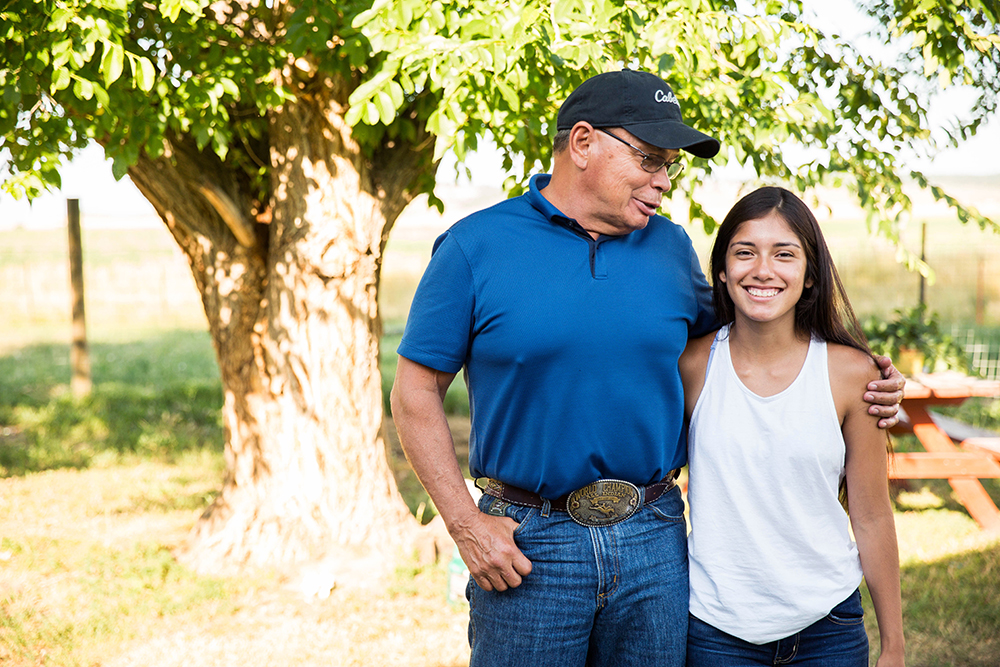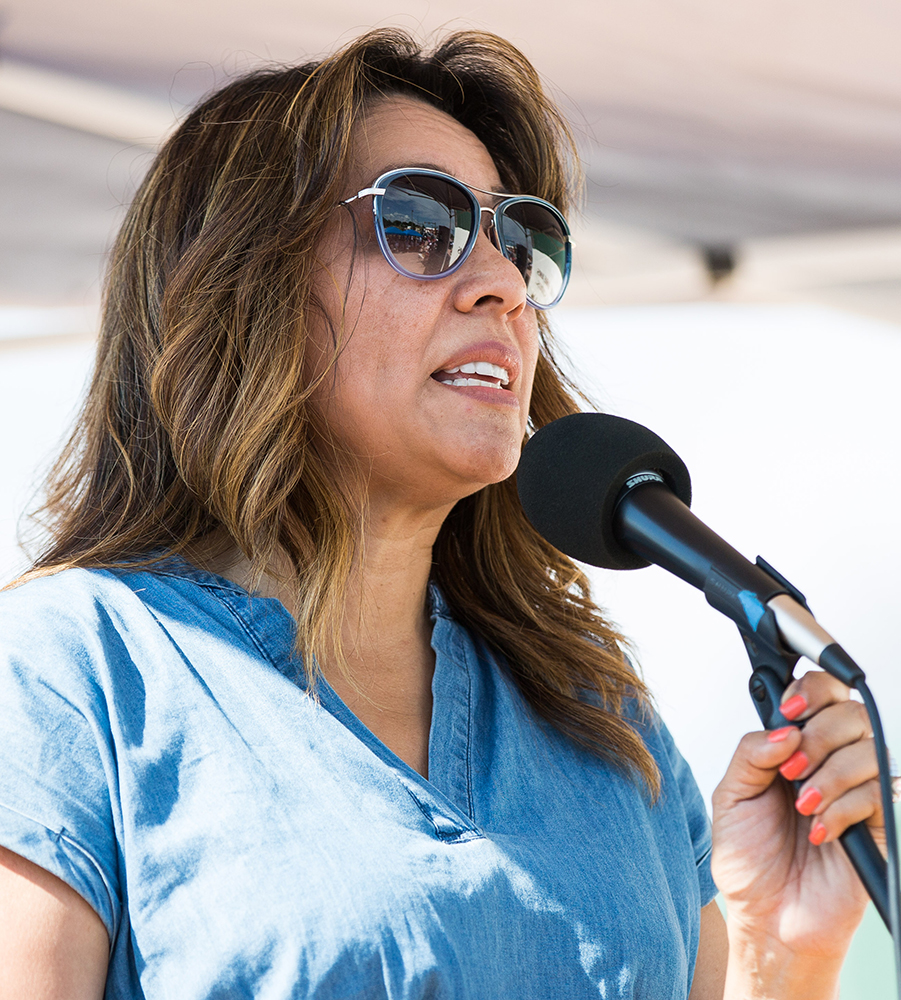True Sioux Hope Foundation, ASU partner to offer Native students a big boost

Last April, Mariah McGhee had resigned herself to the fact that college wasn’t in the cards.
McGhee, a class valedictorian who had often visited Arizona, had dreamed of attending Arizona State University since she was 5. But McGhee (pictured above with her mom) knew her family couldn’t afford out-of-state tuition, and she was adamant about not racking up personal debt through student loans. The 18-year-old was prepared to start her work career without a degree.
Then a miracle dropped in her lap: a full four-year scholarship to ASU.
“It wasn’t just a surprise but a real shock,” said McGhee, who graduated from Red Cloud High School on the Pine Ridge Indian Reservation in South Dakota. “When they brought me into the principal’s office to give me some news, I thought I was in trouble.”
Savannah Jacobs (pictured with her father, Chuck Jacobs, at their home on the Pine Ridge Indian Reservation in South Dakota) is one of the two students sponsored by True Sioux Hope Foundation. She will study political science at ASU. Her plan is to get her degree and then “come back to Pine Ridge and help in the fight” to improve lives there. Photo by Deanna Dent/ASU Now
When McGhee arrived, she also encountered classmate Savannah Jacobs, who also thought she was in trouble. After a few suspenseful moments, they were told to pack their bags because they were headed to ASU.
“We both cried and had tears streaming down our faces. It was a huge gift,” recalled Jacobs, who plans on majoring in political science. McGhee said she will study business entrepreneurship at W. P. Carey School of Business.
Their scholarships are a result of a new initiative between the ASU FoundationFormed in 2014, the True Sioux Hope Foundation is a nonprofit organization aimed at combating poverty, improving education and creating sustainable organizations for the Oglala Lakota Sioux Tribe on the Pine Ridge Reservation., the Center for Indian Education and the True Sioux Hope Foundation, which is sponsoring a pair of Native students from Pine Ridge to attend ASU.
“Given who we are as an institution, with a charterASU’s charter reads: “ASU is a comprehensive public research university, measured not by whom we exclude, but rather by whom we include and how they succeed; advancing research and discovery of public value; and assuming fundamental responsibility for the economic, social, cultural and overall health of the communities it serves.” that clearly outlines our work in being inclusive, interested in how our students succeed, and that we assume responsibility for people and society, this opportunity is perfect for us,” said Bryan Brayboy, ASU special adviser to the president and President’s Professor of indigenous education and justice. “We want to partner with Pine Ridge in order to help them define and enact their future. This starts, in part, with Mariah and Savannah.”
Brayboy added that ASU is an excellent place for McGhee and Jacobs to seek their higher education as the university will welcome more than 2,700 indigenous students this fall and is responsible for 20 percent of the nation’s American Indian doctoral students.
True Sioux Hope Foundation founder Twila True addresses the crowd and thanks them for coming to see their programs at Pine Ridge. Photo by Deanna Dent/ASU Now
That’s one of the reasons why True Sioux Hope Foundation leader Twila True partnered with ASU.
“They got a whisper of what we were trying to do and said, ‘Tell us more,’” said True, a philanthropist, entrepreneur, and co-founder and CEO of True Investments, a real estate private equity firm based in Newport Beach, Calif., where True resides.
As a youngster, True was whisked to California from Pine Ridge as part of the Indian Relocation Act of 1956, a federal program intended to encourage Native Americans to leave Indian reservations to acquire vocational skills and assimilate into the general population throughout the 1950s and 1960s.
Today True is a successful businessperson, but she never forgot her roots.
“The Pine Ridge Reservation has always had a place in my heart,” True said. “I had tribe, I had family and I had culture.”
True also wants to change part of their culture — the one that gets the most ink these days.
Pine Ridge is considered the most economically disadvantaged reservation in the United States with a 90 percent unemployment rate and average annual household income of $3,500. The student dropout rate is over 70 percent, and the teacher turnover rate is eight times higher than that of the U.S. national average.
“You can’t affect change unless it’s long-term,” True said regarding the scholarships. “We’re all parents now. True Sioux Hope and ASU are now parents of these girls, and we’re going to take them and graduate them from college.”
That was a sentiment echoed by the ASU Foundation.
“Through our partnership with the True Sioux Hope Foundation and the Pine Ridge Indian Reservation, we believe we can work together to rebuild and strengthen capacity in this culturally rich community while ensuring a positive impact for future generations,” said Gretchen Buhlig, CEO of ASU Foundation, the independent nonprofit that raises and invests private donations in support of ASU.
The two scholarships are just the beginning of the partnership. Although details are still being ironed out, there are plans afoot for ASU to help rebuild and strengthen the capacity of Pine Ridge. Brayboy says this will be done through education, housing, economic development, and health and well-being initiatives created by ASU and True Sioux Hope to ensure positive impact for generations to come. He was quick to point out that this is all happening in partnership with and at the direction of the Pine Ridge community, and he hopes that it will become a model for other universities and entities looking to boost other tribal communities throughout the country.
McGhee and Jacobs said it’s already having an impact on their lives. The two have vowed they'll return to the reservation after graduation and use their education to improve the lives of others. McGhee wants to start a business there while Jacobs would like to start a fund or organization to enable Native students like herself to go to college.
“The goal is to get a college degree from ASU, come back to Pine Ridge and help in the fight,” Jacobs said.
Top photo: True Sioux Hope Foundation scholarship recipient Mariah McGhee (right) and her mother, Donna McGhee, pose for a portrait on the Pine Ridge Indian Reservation on July 7. McGhee plans to study business entrepreneurship at ASU. Photo by Deanna Dent/ASU Now
More Arts, humanities and education

ASU professor's project helps students learn complex topics
One of Arizona State University’s top professors is using her signature research project to improve how college students learn science, technology, engineering, math and medicine.Micki Chi, who is a…

Award-winning playwright shares her scriptwriting process with ASU students
Actions speak louder than words. That’s why award-winning playwright Y York is workshopping her latest play, "Becoming Awesome," with actors at Arizona State University this week. “I want…

Exceeding great expectations in downtown Mesa
Anyone visiting downtown Mesa over the past couple of years has a lot to rave about: The bevy of restaurants, unique local shops, entertainment venues and inviting spaces that beg for attention from…



